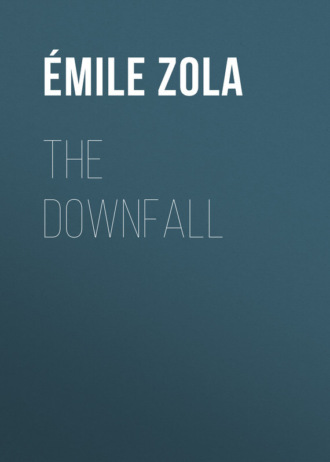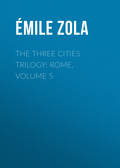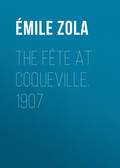
Эмиль Золя
The Downfall
“There is nothing here that is needed. Get me some linen; try and see if you can’t find some more mattresses; show my men where the pump is – ”
And they ran as if their life was at stake to do his bidding; were so active that they seemed to be ubiquitous.
The factory was admirably adapted for a hospital. The drying-room was a particularly noticeable feature, a vast apartment with numerous and lofty windows for light and ventilation, where they could put in a hundred beds and yet have room to spare, and at one side was a shed that seemed to have been built there especially for the convenience of the operators: three long tables had been brought in, the pump was close at hand, and a small grass-plot adjacent might serve as ante-chamber for the patients while awaiting their turn. And the handsome old elms, with their deliciously cool shade, roofed the spot in most agreeably.
Bouroche had considered it would be best to establish himself in Sedan at the commencement, foreseeing the dreadful slaughter and the inevitable panic that would sooner or later drive the troops to the shelter of the ramparts. All that he had deemed it necessary to leave with the regiment was two flying ambulances and some “first aids,” that were to send him in the casualties as rapidly as possible after applying the primary dressings. The details of litter-bearers were all out there, whose duty it was to pick up the wounded under fire, and with them were the ambulance wagons and fourgons of the medical train. The two assistant-surgeons and three hospital stewards whom he had retained, leaving two assistants on the field, would doubtless be sufficient to perform what operations were necessary. He had also a corps of dressers under him. But he was not gentle in manner and language, for all he did was done impulsively, zealously, with all his heart and soul.
“Tonnerre de Dieu! how do you suppose we are going to distinguish the cases from one another when they begin to come in presently? Take a piece of charcoal and number each bed with a big figure on the wall overhead, and place those mattresses closer together, do you hear? We can strew some straw on the floor in that corner if it becomes necessary.”
The guns were barking, preparing his work for him; he knew that at any moment now the first carriage might drive up and discharge its load of maimed and bleeding flesh, and he hastened to get all in readiness in the great, bare room. Outside in the shed the preparations were of another nature: the chests were opened and their contents arranged in order on a table, packages of lint, bandages, compresses, rollers, splints for fractured limbs, while on another table, alongside a great jar of cerate and a bottle of chloroform, were the surgical cases with their blood-curdling array of glittering instruments, probes, forceps, bistouries, scalpels, scissors, saws, an arsenal of implements of every imaginable shape adapted to pierce, cut, slice, rend, crush. But there was a deficient supply of basins.
“You must have pails, pots, jars about the house – something that will hold water. We can’t work besmeared with blood all day, that’s certain. And sponges, try to get me some sponges.”
Madame Delaherche hurried away and returned, followed by three women bearing a supply of the desired vessels. Gilberte, standing by the table where the instruments were laid out, summoned Henriette to her side by a look and pointed to them with a little shudder. They grasped each other’s hand and stood for a moment without speaking, but their mute clasp was eloquent of the solemn feeling of terror and pity that filled both their souls. And yet there was a difference, for one retained, even in her distress, the involuntary smile of her bright youth, while in the eyes of the other, pale as death, was the grave earnestness of the heart which, one love lost, can never love again.
“How terrible it must be, dear, to have an arm or leg cut off!”
“Poor fellows!”
Bouroche had just finished placing a mattress on each of the three tables, covering them carefully with oil-cloth, when the sound of horses’ hoofs was heard outside and the first ambulance wagon rolled into the court. There were ten men in it, seated on the lateral benches, only slightly wounded; two or three of them carrying their arm in a sling, but the majority hurt about the head. They alighted with but little assistance, and the inspection of their cases commenced forthwith.
One of them, scarcely more than a boy, had been shot through the shoulder, and as Henriette was tenderly assisting him to draw off his greatcoat, an operation that elicited cries of pain, she took notice of the number of his regiment.
“Why, you belong to the 106th! Are you in Captain Beaudoin’s company?”
No, he belonged to Captain Bonnaud’s company, but for all that he was well acquainted with Corporal Macquart and felt pretty certain that his squad had not been under fire as yet. The tidings, meager as they were, sufficed to remove a great load from the young woman’s heart: her brother was alive and well; if now her husband would only return, as she was expecting every moment he would do, her mind would be quite at rest.
At that moment, just as Henriette raised her head to listen to the cannonade, which was then roaring with increased viciousness, she was thunderstruck to see Delaherche standing only a few steps away in the middle of a group of men, to whom he was telling the story of the frightful dangers he had encountered in getting from Bazeilles to Sedan. How did he happen to be there? She had not seen him come in. She darted toward him.
“Is not my husband with you?”
But Delaherche, who was just then replying to the fond questions of his wife and mother, was in no haste to answer.
“Wait, wait a moment.” And resuming his narrative: “Twenty times between Bazeilles and Balan I just missed being killed. It was a storm, a regular hurricane, of shot and shell! And I saw the Emperor, too. Oh! but he is a brave man! – And after leaving Balan I ran – ”
Henriette shook him by the arm.
“My husband?”
“Weiss? why, he stayed behind there, Weiss did.”
“What do you mean, behind there?”
“Why, yes; he picked up the musket of a dead soldier, and is fighting away with the best of them.”
“He is fighting, you say? – and why?”
“He must be out of his head, I think. He would not come with me, and of course I had to leave him.”
Henriette gazed at him fixedly, with wide-dilated eyes. For a moment no one spoke; then in a calm voice she declared her resolution.
“It is well; I will go to him.”
What, she, go to him? But it was impossible, it was preposterous! Delaherche had more to say of his hurricane of shot and shell. Gilberte seized her by the wrists to detain her, while Madame Delaherche used all her persuasive powers to convince her of the folly of the mad undertaking. In the same gentle, determined tone she repeated:
“It is useless; I will go to him.”
She would only wait to adjust upon her head the lace scarf that Gilberte had been wearing and which the latter insisted she should accept. In the hope that his offer might cause her to abandon her resolve Delaherche declared that he would go with her at least as far as the Balan gate, but just then he caught sight of the sentry, who, in all the turmoil and confusion of the time, had been pacing uninterruptedly up and down before the building that contained the treasure chests of the 7th corps, and suddenly he remembered, was alarmed, went to give a look and assure himself that the millions were there still. In the meantime Henriette had reached the portico and was about to pass out into the street.
“Wait for me, won’t you? Upon my word, you are as mad as your husband!”
Another ambulance had driven up, moreover, and they had to wait to let it pass in. It was smaller than the other, having but two wheels, and the two men whom it contained, both severely wounded, rested on stretchers placed upon the floor. The first one whom the attendants took out, using the most tender precaution, had one hand broken and his side torn by a splinter of shell; he was a mass of bleeding flesh. The second had his left leg shattered; and Bouroche, giving orders to extend the latter on one of the oil-cloth-covered mattresses, proceeded forthwith to operate on him, surrounded by the staring, pushing crowd of dressers and assistants. Madame Delaherche and Gilberte were seated near the grass-plot, employed in rolling bandages.
In the street outside Delaherche had caught up with Henriette.
“Come, my dear Madame Weiss, abandon this foolhardy undertaking. How can you expect to find Weiss in all that confusion? Most likely he is no longer there by this time; he is probably making his way home through the fields. I assure you that Bazeilles is inaccessible.”
But she did not even listen to him, only increasing her speed, and had now entered the Rue de Menil, her shortest way to the Balan gate. It was nearly nine o’clock, and Sedan no longer wore the forbidding, funereal aspect of the morning, when it awoke to grope and shudder amid the despair and gloom of its black fog. The shadows of the houses were sharply defined upon the pavement in the bright sunlight, the streets were filled with an excited, anxious throng, through which orderlies and staff officers were constantly pushing their way at a gallop. The chief centers of attraction were the straggling soldiers who, even at this early hour of the day, had begun to stream into the city, minus arms and equipments, some of them slightly wounded, others in an extreme condition of nervous excitation, shouting and gesticulating like lunatics. And yet the place would have had very much its every-day aspect, had it not been for the tight-closed shutters of the shops, the lifeless house-fronts, where not a blind was open. Then there was the cannonade, that never-ceasing cannonade, beneath which earth and rocks, walls and foundations, even to the very slates upon the roofs, shook and trembled.
What between the damage that his reputation as a man of bravery and politeness would inevitably suffer should he desert Henriette in her time of trouble, and his disinclination to again face the iron hail on the Bazeilles road, Delaherche was certainly in a very unpleasant predicament. Just as they reached the Balan gate a bevy of mounted officers, returning to the city, suddenly came riding up, and they were parted. There was a dense crowd of people around the gate, waiting for news. It was all in vain that he ran this way and that, looking for the young woman in the throng; she must have been beyond the walls by that time, speeding along the road, and pocketing his gallantry for use on some future occasion, he said to himself aloud:
“Very well, so much the worse for her; it was too idiotic.”
Then the manufacturer strolled about the city, bourgeois-like desirous to lose no portion of the spectacle, and at the same time tormented by a constantly increasing feeling of anxiety. How was it all to end? and would not the city suffer heavily should the army be defeated? The questions were hard ones to answer; he could not give a satisfactory solution to the conundrum when so much depended on circumstances, but none the less he was beginning to feel very uneasy for his factory and house in the Rue Maqua, whence he had already taken the precaution to remove his securities and valuables and bury them in a place of safety. He dropped in at the Hotel de Ville, found the Municipal Council sitting in permanent session, and loitered away a couple of hours there without hearing any fresh news, unless that affairs outside the walls were beginning to look very threatening. The army, under the pushing and hauling process, pushed back to the rear by General Ducrot during the hour and a half while the command was in his hands, hauled forward to the front again by de Wimpffen, his successor, knew not where to yield obedience, and the entire lack of plan and competent leadership, the incomprehensible vacillation, the abandonment of positions only to retake them again at terrible cost of life, all these things could not fail to end in ruin and disaster.
From there Delaherche pushed forward to the Sous-Prefecture to ascertain whether the Emperor had returned yet from the field of battle. The only tidings he gleaned here were of Marshal MacMahon, who was said to be resting comfortably, his wound, which was not dangerous, having been dressed by a surgeon. About eleven o’clock, however, as he was again going the rounds, his progress was arrested for a moment in the Grande-Rue, opposite the Hotel de l’Europe, by a sorry cavalcade of dust-stained horsemen, whose jaded nags were moving at a walk, and at their head he recognized the Emperor, who was returning after having spent four hours on the battle-field. It was plain that death would have nothing to do with him. The big drops of anguish had washed the rouge from off those painted cheeks, the waxed mustache had lost its stiffness and drooped over the mouth, and in that ashen face, in those dim eyes, was the stupor of one in his last agony. One of the officers alighted in front of the hotel and proceeded to give some friends, who were collected there, an account of their route, from la Moncelle to Givonne, up the entire length of the little valley among the soldiers of the 1st corps, who had already been pressed back by the Saxons across the little stream to the right bank; and they had returned by the sunken road of the Fond de Givonne, which was even then in such an encumbered condition that had the Emperor desired to make his way to the front again he would have found the greatest difficulty in doing so. Besides, what would it have availed?
As Delaherche was drinking in these particulars with greedy ears a loud explosion shook the quarter. It was a shell, which had demolished a chimney in the Rue Sainte-Barbe, near the citadel. There was a general rush and scramble; men swore and women shrieked. He had flattened himself against the wall, when another explosion broke the windows in a house not far away. The consequences would be dreadful if they should shell Sedan; he made his way back to the Rue Maqua on a keen run, and was seized by such an imperious desire to learn the truth that he did not pause below stairs, but hurried to the roof, where there was a terrace that commanded a view of the city and its environs.
A glance of the situation served to reassure him; the German fire was not directed against the city; the batteries at Frenois and la Marfee were shelling the Plateau de l’Algerie over the roofs of the houses, and now that his alarm had subsided he could even watch with a certain degree of admiration the flight of the projectiles as they sailed over Sedan in a wide, majestic curve, leaving behind them a faint trail of smoke upon the air, like gigantic birds, invisible to mortal eye and to be traced only by the gray plumage shed by their pinions. At first it seemed to him quite evident that what damage had been done so far was the result of random practice by the Prussian gunners: they were not bombarding the city yet; then, upon further consideration, he was of opinion that their firing was intended as a response to the ineffectual fire of the few guns mounted on the fortifications of the place. Turning to the north he looked down from his position upon the extended and complex system of defenses of the citadel, the frowning curtains black with age, the green expanses of the turfed glacis, the stern bastions that reared their heads at geometrically accurate angles, prominent among them the three cyclopean salients, the Ecossais, the Grand Jardin, and la Rochette, while further to the west, in extension of the line, were Fort Nassau and Fort Palatinat, above the faubourg of Menil. The sight produced in him a melancholy impression of immensity and futility. Of what avail were they now against the powerful modern guns with their immense range? Besides, the works were not manned; cannon, ammunition, men were wanting. Some three weeks previously the governor had invited the citizens to organize and form a National Guard, and these volunteers were now doing duty as gunners; and thus it was that there were three guns in service at Palatinat, while at the Porte de Paris there may have been a half dozen. As they had only seven or eight rounds to each gun, however, the men husbanded their ammunition, limiting themselves to a shot every half hour, and that only as a sort of salve to their self-respect, for none of their missiles reached the enemy; all were lost in the meadows opposite them. Hence the enemy’s batteries, disdainful of such small game, contemptuously pitched a shell at them from time to time, out of charity, as it were.
Those batteries over across the river were objects of great interest to Delaherche. He was eagerly scanning the heights of la Marfee with his naked eye, when all at once he thought of the spy-glass with which he sometimes amused himself by watching the doings of his neighbors from the terrace. He ran downstairs and got it, returned and placed it in position, and as he was slowly sweeping the horizon and trees, fields, houses came within his range of vision, he lighted on that group of uniforms, at the angle of a pine wood, over the main battery at Frenois, of which Weiss had caught a glimpse from Bazeilles. To him, however, thanks to the excellence of his glass, it would have been no difficult matter to count the number of officers of the staff, so distinctly he made them out. Some of them were reclining carelessly on the grass, others were conversing in little groups, and in front of them all stood a solitary figure, a spare, well-proportioned man to appearances, in an unostentatious uniform, who yet asserted in some indefinable way his masterhood. It was the Prussian King, scarce half finger high, one of those miniature leaden toys that afford children such delight. Although he was not certain of this identity until later on the manufacturer found himself, by reason of some inexplicable attraction, constantly returning to that diminutive puppet, whose face, scarce larger than a pin’s head, was but a pale point against the immense blue sky.
It was not midday yet, and since nine o’clock the master had been watching the movements, inexorable as fate, of his armies. Onward, ever onward, they swept, by roads traced for them in advance, completing the circle, slowly but surely closing in and enveloping Sedan in their living wall of men and guns. The army on his left, that had come up across the level plain of Donchery, was debouching still from the pass of Saint-Albert and, leaving Saint-Menges in its rear, was beginning to show its heads of columns at Fleigneux; and, in the rear of the XIth corps, then sharply engaged with General Douay’s force, he could discern the Vth corps, availing itself of the shelter of the woods and advancing stealthily on Illy, while battery upon battery came wheeling into position, an ever-lengthening line of thundering guns, until the horizon was an unbroken ring of fire. On the right the army was now in undisputed possession of the valley of the Givonne; the XIIth corps had taken la Moncelle, the Guards had forced the passage of the stream at Daigny, compelling General Ducrot to seek the protection of the wood of la Garenne, and were pushing up the right bank, likewise in full march upon the plateau of Illy. Their task was almost done; one effort more, and up there at the north, among those barren fields, on the very verge of the dark forests of the Ardennes, the Crown Prince of Prussia would join hands with the Crown Prince of Saxony. To the south of Sedan the village of Bazeilles was lost to sight in the dense smoke of its burning houses, in the clouds of dun vapor that rose above the furious conflict.
And tranquilly, ever since the morning, the King had been watching and waiting. An hour yet, two hours, it might be three, it mattered not; it was only a question of time. Wheel and pinion, cog and lever, were working in harmony, the great engine of destruction was in motion, and soon would have run its course. In the center of the immense horizon, beneath the deep vault of sunlit sky, the bounds of the battlefield were ever becoming narrower, the black swarms were converging, closing in on doomed Sedan. There were fiery reflexions in the windows of the city; to the left, in the direction of the Faubourg de la Cassine, it seemed as if a house was burning. And outside the circle of flame and smoke, in the fields no longer trodden by armed men, over by Donchery, over by Carignan, peace, warm and luminous, lay upon the land; the bright waters of the Meuse, the lusty trees rejoicing in their strength, the broad, verdant meadows, the fertile, well-kept farms, all rested peacefully beneath the fervid noonday sun.
Turning to his staff, the King briefly called for information upon some point. It was the royal will to direct each move on the gigantic chessboard; to hold in the hollow of his hand the hosts who looked to him for guidance. At his left, a flock of swallows, affrighted by the noise of the cannonade, rose high in air, wheeled, and vanished in the south.







